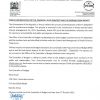The Controller of Budget FCPA Dr Margaret Nyakang’o, CBS, delivering her address during the National Assembly BAC meeting
The Controller of Budget (CoB), FCPA Dr. Margaret Nyakang’o, appeared before the National Assembly Budget and Appropriations Committee (BAC) to discuss the Annual National Government Budget Implementation Review Report (NG-BIRR) for FY 2024/25. Her presentation highlighted five central issues shaping Kenya’s fiscal path: revenue performance, deficit financing, exchequer releases, expenditures incurred under Article 223 of the Constitution, pending bills, and the major challenges affecting budget implementation.
During the deliberations, Dr Nyakangó reviewed the NG-BIRR, and further analyzed in depth the revenue performance against the established targets and the inflows into the Consolidated Fund. She also assessed how the deficit was financed, emphasizing the delicate balance between domestic and external borrowing. Equally important, were the quarterly exchequer releases for recurrent and developmental expenditures to ministries, departments, agencies, and counties, and whether these funds reached frontline priorities. The CoB further outlined allocations to education capitation, social protection programs, public participation initiatives, and the National Government Constituency Development Fund, as well as the performance of donor-funded programs that are crucial in delivering services.

The Controller of Budget FCPA Dr Margaret Nyakang’o CBS, addressing the Committee during the meeting
The Committee also sought clarity on expenditures incurred under Article 223 of the Constitution, which allows for spending outside the approved budget. Dr. Nyakang’o presented a detailed summary of how these provisions had been applied during the year, stressing the need for stricter controls to safeguard accountability. She reported that a total of Kshs.83.98 billion was approved under Article 223 of the Constitution during the reporting period, with Kshs.66.53 billion authorized for withdrawals from the Consolidated Fund. Much of these funds were used to cater for predictable expenditures, including pending bills in infrastructure and salary arrears for medical doctors.
Another key focus was the impact of mid-year budget reviews, which often disrupt planned projects, delay service delivery, and undermine fiscal predictability. The CoB stressed the need for fiscal discipline and careful planning so that these reviews strengthen rather than weaken the budget process.
The issue of pending bills was also featured prominently during the discussions. The Controller of Budget mentioned that with the Government transitioning to accrual accounting, the burden of unpaid obligations will be a ticking time bomb. She further stated that accumulated bills were not only choking service delivery but also raising questions about fiscal credibility. Dr Nyakang’o stressed further that verifying, prioritizing, and clearing pending bills would be crucial for a clean transition to accrual-based reporting.
Finally, the session addressed the key challenges in budget implementation, including revenue shortfalls, delays in donor disbursements, under-funding of key sectors, overreliance and misuse of Article 223 for foreseeable expenses by MDAs. Dr Nyakang’o recommended the timely settlement of pending bills, aligning budget revisions with priorities, deeper collaboration with development partners, and stronger fiscal discipline across all spending units. Her presentation not only shed light on the state of budget execution but also reaffirmed the Controller of Budget’s critical role in promoting accountability, transparency, efficiency, and long-term fiscal sustainability in Kenya.




NO COMMENT
LEAVE A REPLY